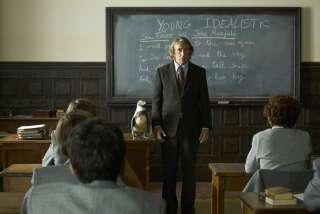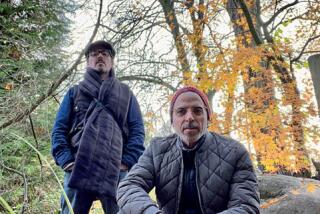PAGE TO SCREEN
- Share via
Jim Harrison is one of those authors filmmakers get without getting them right. In “Revenge,” a movie based on a Harrison novella, the characters lip-sync passion. “Legends of the Fall,” also adapted from a Harrison novella, is a color Xerox of Montana.
Readers of those books were stirred by Harrison’s evocative prose and looping narrative style but all the movie audiences got were loving close-ups of Madeleine Stowe’s mouth and Brad Pitt’s teeth.
The newest Harrison adaptation is “Carried Away,” from a novella called “Farmer.” The story is vintage Harrison: Romantic, reckless, masculine. Joseph (played by Dennis Hopper), a middle-aged bachelor schoolteacher, embarks on a torrid affair with one of his teenage students, Catherine (Amy Locane). It wakes him up. Old habits and assumptions are called into question, including duck hunting and his longtime engagement to his rather dull childhood sweetheart, Rosealee (Amy Irving). However, rather than destroying their relationship, Joseph’s infidelity ends up reviving it.
The normal Hollywood response to this material would be to hype it. After a soft-core roll in the hay, Joseph would race his pickup truck along dirt roads and recite erotic poetry in the classroom. The film’s director, Bruno Barreto, had other things in mind.
“What Jim writes is so moving and emotional, but it could translate into bad melodrama if it’s not done with restraint,” he says. “I wanted to do a film that’s real, and looks real.”
It does. Hopper and Irving have looked better on-screen, particularly in a love scene that to Barreto’s mind is the pivotal moment in the movie. In fact, his whole concept of the story flowed from this one episode, which was lifted straight from the book. It’s about making love with the lights on. (That might not seem so radical, but Barreto’s treatment of this scene makes you realize that Hollywood makes love with the lights off, or at least dimmed, and that the actors are nude rather than naked.)
Because Barreto chose to emphasize Joseph and Rosealee’s relationship, he jettisoned many of the novella’s subplots--Joseph’s twin sister, his dead father, Rosealee’s son’s homosexuality--and streamlined the narrative, making it linear. He had to flesh out Rosealee and Catherine, in part because his approach demanded it, in part because the needs of filmmaking demanded it.
“You have many more choices narrative-wise when you’re writing a novel than when you’re writing a screenplay,” Barreto says. “Whatever you want to convey has to be played between the characters. In literature, you have the storyteller, but in a movie that is a lot more hidden.
“The filmmaker’s voice is the way he picks his shots and directs his actors, and the look.”
And the look here is really something to behold.
More to Read
Only good movies
Get the Indie Focus newsletter, Mark Olsen's weekly guide to the world of cinema.
You may occasionally receive promotional content from the Los Angeles Times.










